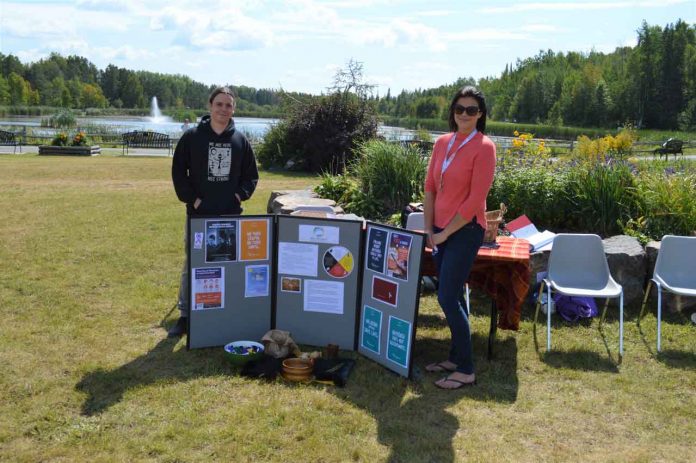
ATTAWAPISKAT – In the midst of this restrictive pandemic with mask wearing and social distancing, there are many people in our communities who are continuing to help others in health care. Health care workers everywhere are having to work twice as hard to make sure they are assisting the most vulnerable people in our communities.
On a bright August afternoon, I spent time with Chris Karn and Donna McCulloch of Mino M’shki-ki Indigenous Health Team of Kirkland Lake. They had set up an information booth next to the Kinross Pond where local people frequent to enjoy the natural scenery. This dedicated health duo spent the afternoon on site practicing safe Covid19 protocols of masks and distancing in recognition of Overdose Awareness Day with the aim of raising awareness and attention to a horrific health crisis concerning overdose deaths.
I was happy to see these individuals doing their best to make others aware of a critical epidemic that has been affecting our world for over two decades now. The opioid epidemic has been caused by the overuse, misuse and abuse of prescription opioids as far back the as the 90s. At first the crisis emerged from the abuse of powerful prescription opioid pain medications like oxycodone. Then as addictions to these substances grew exponentially, a much stronger opioid called fentanyl appeared to worsen the epidemic in the United States and Canada. Another form called Carfentanyl has appeared which is a hundred times more toxic than fentanyl. Many of these drugs are used in and with street drugs like heroin and cocaine and due to the unregulated nature of underground drugs, any street drug now has the potential to cause lifelong health damage or death from overdose.
The world of addictions is very familiar territory for me and many who grew up in a remote Native community. I have seen first hand the destruction caused by addictions to drugs and alcohol. Through the reality of colonization, residential schools and the incursions of the Europeans my people have been broken and in too many cases have turned to drugs and alcohol as a result.
Thanks to a new reality of healing through traditional and cultural teachings and the work of many health care professionals and workers there is hope these days. There are many Indigenous health care organizations like Mino M’shki-ki in communities right across Canada. Still thousands of good people Native and non Native are falling prey to extremely dangerous, life threatening, easy to find and addictive opioids. These are now powerfully addictive drugs that are easier to smuggle, hide and transport and many times more powerful than any previous drug. The opioid crisis has devastated many northern remote communities, cities and towns across Canada.
In my personal sphere, I’ve known family and friends who have fallen into the darkness of drug addiction and some who have died or severely affected their lives from an overdose. As the Covid19 pandemic continues, it was hoped that the opioid epidemic would subside but instead it has only grown worse.
In the midst of all this turmoil, there are people continuing the important work of keeping our world as safe as possible. Chris and Donna explained that organizations such as theirs are there to offer a safe space for those who need help dealing with these addictions. They are a harm reduction distribution site that provides naloxone overdose kits that can save the life of someone who is overdosing, as well as safety material for those who are still actively using while also giving them resources and opportunities to seek help and assistance to break free from these powerful addictions. They both expressed that there is a dire need for safe injection sites.
Donna explained that they are there to counsel those who need help and they do so with a blend of western and Indigenous traditional practices and beliefs. Chris added that the Indigenous philosophy he has learned revolves around seeing every individual as sacred and special, no matter their life experience and that we should all work together to help those who need it the most.
One important lesson that I’ve learned over these pandemics and epidemics is that these are crisis events of our society’s own making. However, I’ve also learned that we can also provide the solutions to these problems if we work together in a spirit of togetherness, partnership and community. I was very thankful to have Donna and Chris remind me of those important teachings and I say Meegwetch to both of them for doing this important work.
www.underthenorthernsky.com




